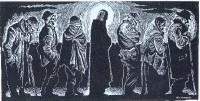

Karen House Catholic Worker
 |
Karen House Catholic Worker |
The RoundTable Electing a Just Society? …On Elections, Responsibility, and Resistance Spring 2008
Major Articles
|
Download Entire Issue by Clicking Image Above (large file - it takes a minute!) |
|||
Karen House: 1840 Hogan St. Saint Louis, MO 63106 Contact Us: 314.621.4052 |
Regular Features
|
Why This Issue: As it comes time for voting Americans to choose the next “Leader of the Free World,” there seems to be a lot weighing heavy on the minds of the U.S. Media, like whether or not a woman or a black man could (or should) be elected, or which candidate is most in (or out of) touch with the average U.S. citizen. As November nears, though, it seems that coverage of issues will begin to simplify and idealism will begin to fade. A certain cynicism seems to reign over my thoughts, as it seems that presidential candidates will declare Open Season on each other, on credibility, on Terror (with a capital “T” which rhymes with “D” which stands for “depleted uranium”), on Iran, on fair and accountable voting procedures, or on anything that ends up in front of their political spin doctors.
I am lucky, though, and glad to know so many inspiring people who are able to provide hope and offer clarity during these whirlwind months leading up to the election that determines Bush’s successor. Our authors have put forth great effort to discern what is the right path for them, while taking stock of the complexity and breadth of the election issues. How should we vote? Why should we vote? What more can be done? Is casting a ballot a step towards Utopia or sidestepping the major problems?
It is amazing to me the amount of consensus that our authors reach in this issue of the Roundtable, given that not one saw another’s article before turning in his or her work. Howard Zinn, the primacy of love and personalist relationships, utopia, certain criticisms of current American politics, a great deal of story-telling, some practical advice, and of course poetic reminders of what our world could be like.
Mark Chmiel takes us outside the boundaries of “thinkable thought” and the “preferential option for the rich” as it manifests the exceptional destiny of America vs. the unexceptional destiny of Afghanistan, Iraq, and Iran. Eric Anglada and Carolyn Griffith explore the complexities of trying to stay true to ideals while considering the issue of participation in the dirty mechanics of our voting system. Annjie Schiefelbein gives us a whimsical description of what a Catholic Worker Utopia could look like (in Nebraska). Annjie’s description of Utopia is then followed by Jenny Truax who lays out a map of how we can get to where we would like to be. Jenny not only gives us a quick refresher on the “Aims and Means,” but a series of tangible, often St. Louis-specific suggestions on living our ideals into reality. Bill Ramsey investigates our relationship to and our responsibility within systems of power. Finally, we hear from a new community member (there are many recently) in “From Karen House”, and we hear from Mozambique in “From Abroad.” I’ll leave you with a whim and a rhyme:
Whose voices could we amplify, what values could we exemplify, what future could we ratify, by our actions in elections Whose voices are we hearing as November comes a’nearing, who’s guiding our projections as we’re making our selections As soundbites keep on shrinking, and in glorious rhetoric we’re sinking, what major modes of thinking could aid our autumnal calculations Dear Reader, keep on reading, as electoral politics take a beating, and our authors know what you are needing, to make your careful evaluations
- John Carroll |
The RoundTable is 24 pages long. To download, you'll need the most recent version of Adobe Acrobat. Download Adobe Acrobat 8 here (it's easy AND free!)
Search all of the RoundTable issues for an author, subject or title here: |